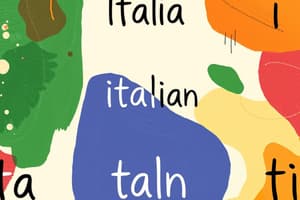Podcast
Questions and Answers
What does the phrase 'Mangiare con gli occhi chiusi' metaphorically refer to?
What does the phrase 'Mangiare con gli occhi chiusi' metaphorically refer to?
What is the message conveyed by the saying 'Non è tutta la vita'?
What is the message conveyed by the saying 'Non è tutta la vita'?
What is the purpose of asking 'Che cosa ti porta il mese di maggio?'
What is the purpose of asking 'Che cosa ti porta il mese di maggio?'
Which of the following best describes the importance of learning traditional Italian phrases?
Which of the following best describes the importance of learning traditional Italian phrases?
Signup and view all the answers
Why is practice and exposure important in learning Italian, according to the text?
Why is practice and exposure important in learning Italian, according to the text?
Signup and view all the answers
What does the Italian adjective 'Grande' describe?
What does the Italian adjective 'Grande' describe?
Signup and view all the answers
Which Italian adjective is used to describe something as 'Displeasing'?
Which Italian adjective is used to describe something as 'Displeasing'?
Signup and view all the answers
What does the Italian saying 'Dare un pugno di dita' symbolize?
What does the Italian saying 'Dare un pugno di dita' symbolize?
Signup and view all the answers
In Italian, what does the saying 'Il sabato non si fa male' imply?
In Italian, what does the saying 'Il sabato non si fa male' imply?
Signup and view all the answers
Which of the following Italian adjectives means 'Beautiful'?
Which of the following Italian adjectives means 'Beautiful'?
Signup and view all the answers
'Gustoso' in Italian is used to describe something that is:
'Gustoso' in Italian is used to describe something that is:
Signup and view all the answers
Study Notes
Exploring the World of Italian Language: Adjectives and Sayings
In this exploration of the charming Italian language, we'll dive into two engaging aspects — basic adjectives and colorful sayings that bring life and personality to conversations.
Basic Italian Adjectives
Adjectives describe nouns, providing information such as size, shape, quality, or age. Below is a brief list of commonly used Italian adjectives you might come across:
- Bel: Beautiful
- Buono: Good
- Cattivo: Bad
- Grande: Large
- Piccolo: Small
- Vecchio: Old
- Nuovo: New
- Lungo: Long
- Bello(a): Attractive (for males and females respectively)
- Brutto(a): Unattractive (for males and females respectively)
- Gustoso: Delicious
- Sgradevole: Displeasing
These examples only scratch the surface as Italian has a wealth of descriptive terms covering various categories and nuances of meaning.
Common Italian Sayings
Throughout Italy, there exist numerous expressions that convey cultural values and enrich daily conversation. Here are some popular Italian sayings worth remembering:
- "Dare un pugno di dita": To give someone your word (literally "giving five fingers," symbolizing trustworthiness). This phrase alludes to giving one’s promise like sealing it with a handshake.
- "Il sabbato non si fa male": Saturday doesn't hurt anyone (meaning everything can wait till tomorrow). Originating from an old saying when Saturdays were considered days of rest.
- "Mangiare con gli occhi chiusi": To eat blindly (metaphorically referring to eating without considering the food's taste). In other words, jumping straight into something based solely on appearance rather than firsthand experience.
- "Non è tutta la vita": It's not all life (indicating things could change for better or worse). A reminder that every moment is temporary and circumstances may shift over time.
- "Che cosa ti porta il mese di maggio?": What does May carry? (an expression asked to humorously remind people of forgetfulness since nothing significant falls during this month).
As you see, learning the basics of Italian includes not just simple grammar but also picking up the traditional ways of speaking and shared ideologies reflected through these phrases. With practice and exposure, these elements will become part of your authentic and enjoyable discovery of the Italian language!
Studying That Suits You
Use AI to generate personalized quizzes and flashcards to suit your learning preferences.
Description
Embark on a journey to explore basic Italian adjectives like 'beautiful' and 'good', as well as colorful sayings like 'To give someone your word' and 'Saturday doesn't hurt anyone'. Discover the essence of Italian language through these expressive elements!




